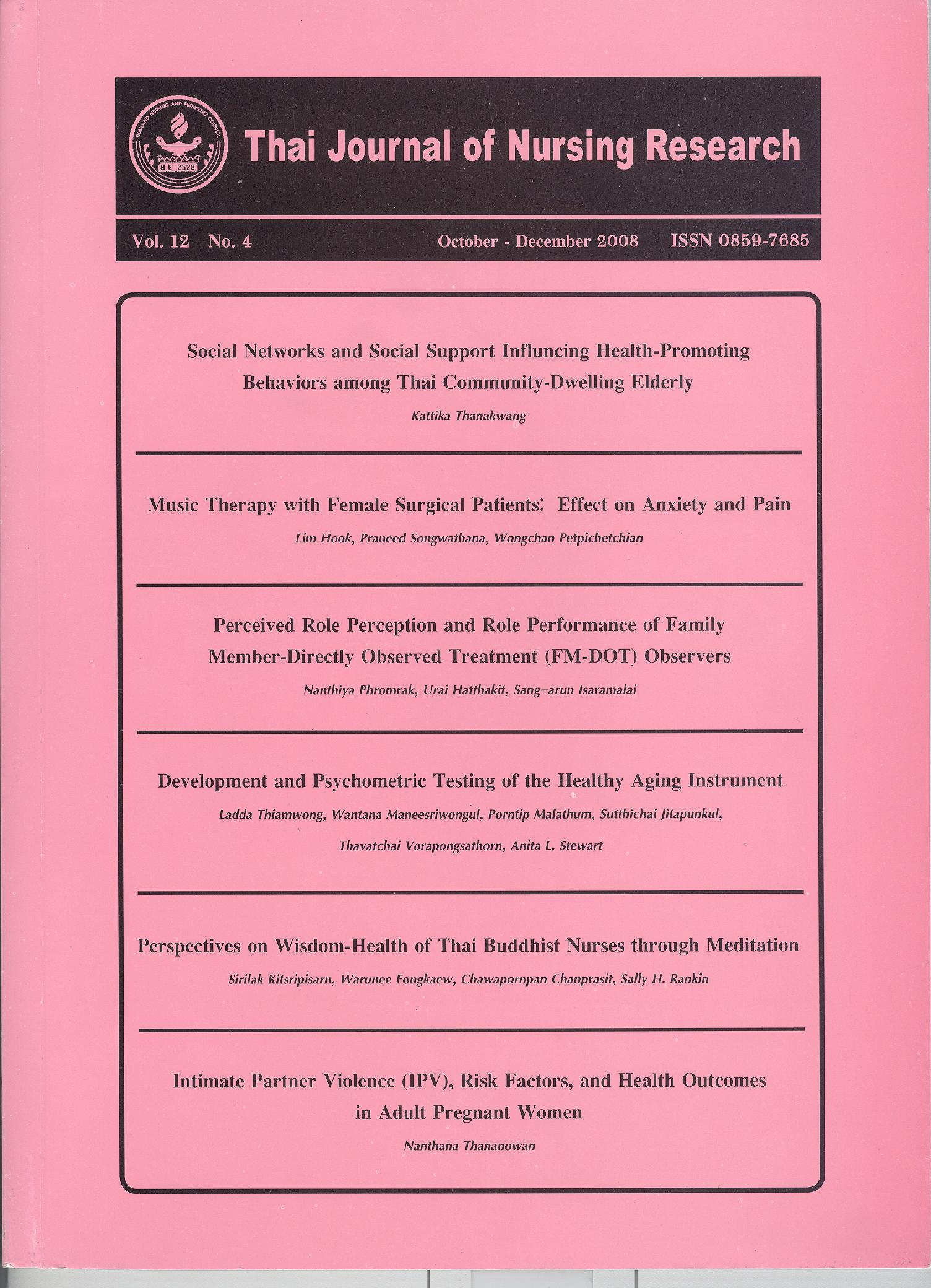Music Therapy with Female Surgical Patients: Effect on Anxiety and Pain
Keywords:
ดนตรี, ความปวด, ความวิตกกังวล, สตรีที่ได้รับการผ่าตัดAbstract
บทคัดย่อ
ความปวดและความวิตกกังวลเป็นปรากฏการณ์ที่พบบ่อยในผู้ป่วยทางศัลยกรรม แม้ว่าดนตรีจะได้รับการพิสูจน์ว่ามีประโยชน์ในการลดความวิตกกังวลและความปวด แต่ยังไม่สามารถบอกถึงผลที่เกิดต่อเนื่อง การศึกษานี้มีวัตถุประสงค์เพื่อศึกษาผลของดนตรีต่อการลดความวิตกกังวลก่อนและหลังผ่าตัดและความปวดหลังผ่าตัดในระยะเวลาต่างๆของสตรีชาวมาเลเซียที่ได้รับการผ่าตัด โดยเป็น การวิจัยกึ่งทดลองแบบสุ่มตัวอย่างที่เป็นกลุ่มทดลอง 51 รายและกลุ่มควบคุม 51 ราย กลุ่มทดลองเป็น กลุ่มที่ได้รับการฟังดนตรีที่เลือกด้วยตนเองวันละสองครั้งตั้งแต่วันก่อนผ่าตัดจนถึงหลังผ่าตัดสามวัน ผู้ป่วยได้รับการประเมินทั้งความวิตกกังวลก่อนและหลังผ่าตัด และความรู้สึกปวดและไม่สุขสบายหลังผ่าตัด โดยใช้มาตรวัด 0-10 รวมทั้งความวิตกกังวลแฝง วิเคราะห์ข้อมูลโดยเปรียบเทียบความแตกต่างระหว่างกลุ่มและระยะเวลาต่างๆด้วยค่าทีและเอฟ
ผลการศึกษาพบว่า กลุ่มทดลองที่ได้ฟังดนตรีมีความวิตกกังวลก่อนผ่าตัดลดลงมากกว่ากลุ่มควบคุม รวมทั้งความวิตกกังวลหลังผ่าตัด ความรู้สึกปวดและไม่สุขสบายหลังผ่าตัดลดลง นอกจากนี้พบว่าดนตรีมีผลสะสมที่ต่อเนื่องในการลดความปวดและวิตกกังวลหลังผ่าตัด โดยสรุปพบว่า การฟังดนตรีที่เลือกด้วยตนเองในวันก่อนผ่าตัดและฟังต่อเนื่อง 3 วันหลังผ่าตัดช่วยลดความปวดและวิตกกังวลอย่างชัดเจน การศึกษานี้จึงให้ข้อเสนอแนะว่า ดนตรีสามารถใช้เป็นกิจกรรมพยาบาลที่เป็นทางเลือกหนึ่งในการผสมผสานกับการรักษาในการลดความวิตกกังวลก่อนผ่าตัด รวมทั้งลดความรู้สึกปวดและไม่สุขสบายหลังผ่าตัดในสตรีที่ได้รับผ่าตัด
คำสำคัญ: ดนตรี ความปวด ความวิตกกังวล สตรีที่ได้รับการผ่าตัด
Abstract
Pain and anxiety are common phenomena for surgical patients. Although music has been shown to be useful and have advantages, as an intervention for managing anxiety and pain, no study was located, using repeated measures. This study examined the effect of music therapy, at multiple times, on reducing pre- and post-operative anxiety, and post-operative pain sensation and pain distress, in 102 Malaysian female surgical patients. A pre/post-test design, with subjects randomly placed into either the music therapy group (n = 51) or the control group (n = 51), was used. Those in the music therapy group listened to self-selected music twice daily the day before surgery and for 3 days post-operative. Visual Analogue Scales were used to measure anxiety before and after the music intervention, as well as pain sensation and pain distress during the post-operative period. State-trait anxiety, during the pre- and post-operative periods, also was measured. Data were analyzed using the T-test and F-test for comparison between groups and across time.
The results showed that the music group reported lower pre-operative anxiety than the control group. The music group demonstrated reduced post-operative anxiety, pain sensation and pain distress. Music was found to have a cumulative effect, post-operatively, across the variables. In summary, listening to self-selected music the day before surgery and continuing for 3 days post-operatively was effective in reducing anxiety, pain sensation and pain distress. The findings suggest the use of music, as a complementary empirically-based nursing intervention, for reducing pre-operative anxiety, post-operative pain sensation and post-operative pain distress among female adult surgical patients.
Key words: Music, pain, anxiety, female surgical patients
Downloads
How to Cite
Issue
Section
License
Copyright: The Pacific Rim International Journal of Nursing Research, Thailand Nursing & Midwifery Council has exclusive rights to publish, reproduce and distribute the manuscript and all contents therein.








.png)



